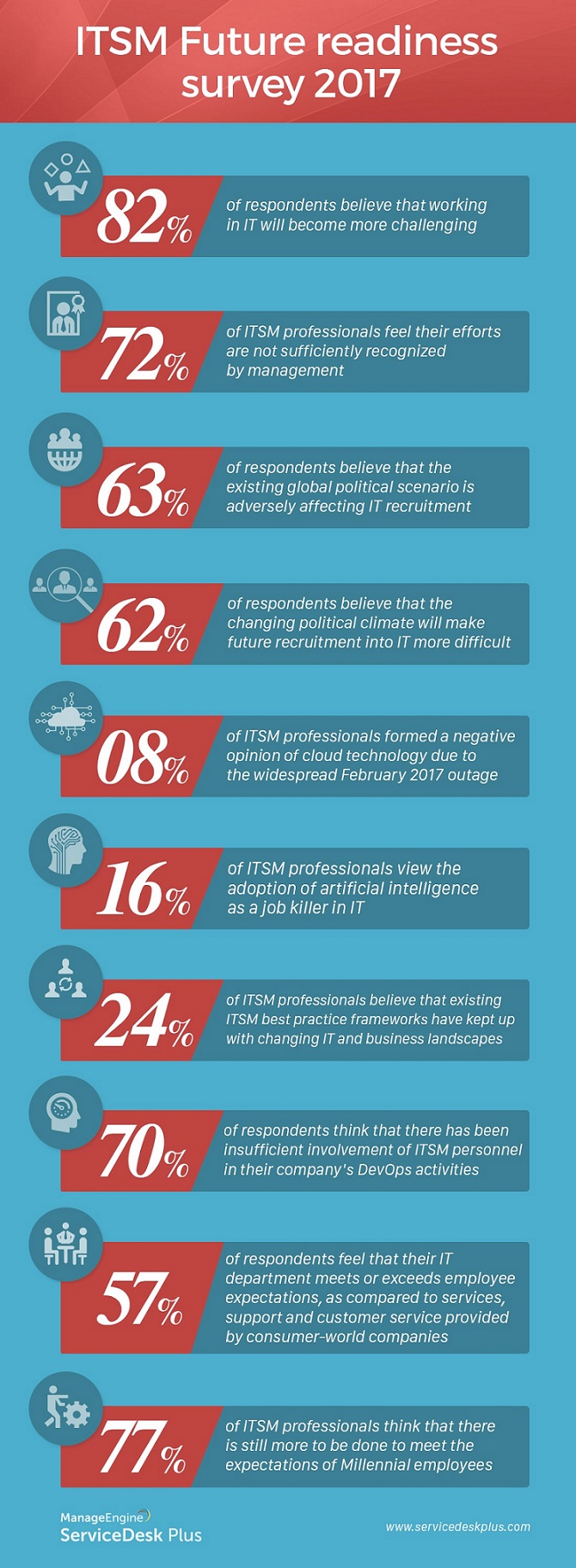A majority (82 percent) of ITSM professionals believe that the IT roles of tomorrow will be more challenging — and the majority of the workforce currently feels undervalued by management, according to ManageEngine's IT Service Management Future Readiness survey.
Key findings include:
■ Only 24 percent of ITSM professionals show confidence in the existing ITSM best practices, including ITIL, making a strong case for their revamp.
■ While only 5 percent of respondents feel that ITIL and other published ITSM practices are irrelevant, roughly 66 percent believe ITIL and other ITSM best practices have failed to keep up with the changing ITSM landscape. These findings reinforce the need for ITIL to reinvent itself to keep pace with the changing trends in IT.
■ Cloud technology continues to enjoy positive feedback from ITSM professionals. The timing of this survey — almost coinciding with the widespread outage of a cloud service provider in February 2017 — also brings to the surface a strong affinity for cloud technology. Even with this incident, only 8 percent of respondents had a negative opinion about cloud.
■ Artificial intelligence (AI) is not seen as a major job disruptor yet, since only 16 percent of respondents view the development of AI as a threat to IT jobs — contradicting what’s seen as a popular notion.
■ With an incoming millennial workforce, 77 percent of ITSM professionals believe that IT teams will have to do more to manage the expectation gap between younger and older employees.
■ More than 60 percent of respondents feel that current global and local political scenarios — like Brexit, the recent US election and Australian immigration policies — will adversely affect recruitment for IT roles.
"The ITSM industry is continually evolving in response to its micro and macro influencers, like technology, people, practices and government regulations," said Rajesh Ganesan, Director of Product Management at ManageEngine. "Being aware of potential future challenges and opportunities helps ITSM professionals stay relevant and responsive to changing landscapes in IT and business, giving their organizations a competitive edge."
"It’s interesting - and worrying - that 82 percent of survey respondents believe that working in IT will get harder over the next three years," said Stephen Mann, Principal Analyst and Content Director at ITSM.tools. "There are multiple root causes, including: nearly two-thirds of respondents think that the current local and global political climate is adversely affecting IT recruitment; only 24 percent of respondents think that existing ITSM best practices have kept up with the changing IT and business landscapes; and 77 percent of respondents think that there is still more to be done to meet the expectations of millennial employees. Ultimately, as an industry, we still need to invest more in getting modern IT support right."


